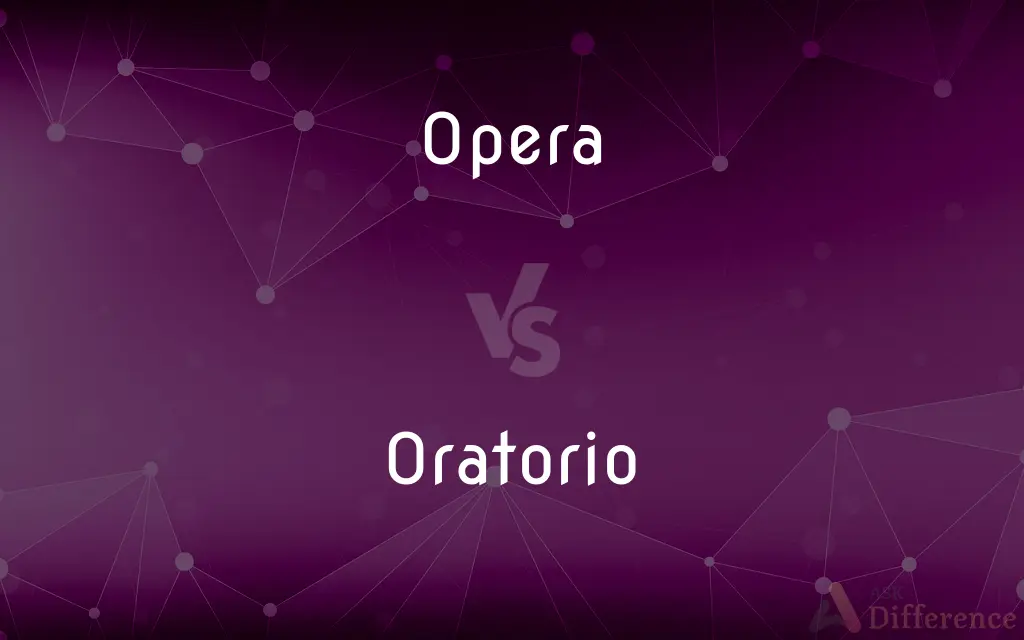Opera vs. Oratorio — What's the Difference?
By Tayyaba Rehman — Updated on September 19, 2023
An opera is a theatrical drama set to music, often with costumes and staging, while an oratorio is a large-scale musical work for orchestra and voices, typically with a religious theme, and performed without costumes or staging.

Difference Between Opera and Oratorio
Table of Contents
ADVERTISEMENT
Key Differences
An opera is essentially a musical drama or a staged play where the dialogue, actions, and emotions are expressed through music, song, and sometimes dance. An oratorio, on the other hand, is a musical composition for voice and orchestra, often based on a religious subject.
While operas are performed with full theatrical trappings including costumes, props, and elaborate sets, oratorios are usually presented in a concert setting without the elements of theater. This means that in an oratorio, there's no acting, costumes, or sets.
Both opera and oratorio can be vast in scale, involving large orchestras and choirs. However, the themes and stories they cover can be different. Operas often delve into dramatic and secular tales of love, betrayal, and conflict, whereas oratorios frequently explore sacred or religious narratives.
The lineage of opera can be traced back to the Renaissance period in Italy, evolving as a blend of musical and theatrical elements. Oratorios have their roots a bit later, emerging in the Baroque period, with composers like Handel and Bach making significant contributions to the genre.
In summary, while both opera and oratorio harness the power of voice and orchestra to tell a story, opera does so in a theatrical manner with staging, whereas oratorio presents its often-religious narrative in a more straightforward concert format.
ADVERTISEMENT
Comparison Chart
Performance Style
Staged with costumes and sets
Concert-style, without staging
Themes
Secular, involving love, drama, etc.
Often religious or sacred
Theatrical Elements
Includes acting, costumes, props
Lacks theatrical elements, no acting or sets
Origin
Renaissance Italy
Baroque period, Europe
Notable Composers
Verdi, Puccini, Wagner
Handel, Bach, Haydn
Compare with Definitions
Opera
A staged musical composition where performers embody characters.
The opera house was packed for the evening's performance.
Oratorio
A large musical composition for orchestra and voices without theatrical staging.
Handel's Messiah is a renowned oratorio performed during the Christmas season.
Opera
A narrative expressed through orchestration and vocal performance.
Attending an opera is a cultural experience like no other.
Oratorio
A concert work often on a religious theme, lacking costumes and sets.
The church hosted an oratorio highlighting biblical stories.
Opera
A blend of orchestral music and sung dialogue to convey a story.
The opera ended with a dramatic and emotional finale.
Oratorio
A narrative set to music, presented in a concert style.
The oratorio captivated the audience with its powerful vocal renditions.
Opera
A theatrical work combining drama, music, song, and sometimes dance.
La Traviata is a famous opera composed by Verdi.
Oratorio
A choral composition typically centered around sacred subjects.
The composer's new oratorio was inspired by ancient scriptures.
Opera
Opera is a form of theatre in which music is a fundamental component and dramatic roles are taken by singers, but is distinct from musical theatre. Such a "work" (the literal translation of the Italian word "opera") is typically a collaboration between a composer and a librettist and incorporates a number of the performing arts, such as acting, scenery, costume, and sometimes dance or ballet.
Oratorio
An extended musical work, blending voices and instruments, without the element of acting.
The choir practiced for months for the upcoming oratorio performance.
Opera
A theatrical presentation in which a dramatic performance is set to music.
Oratorio
An oratorio (Italian pronunciation: [oraˈtɔːrjo]) is a large musical composition for orchestra, choir, and soloists. Like most operas, an oratorio includes the use of a choir, soloists, an instrumental ensemble, various distinguishable characters, and arias.
Opera
The score of such a work.
Oratorio
A musical composition for voices and orchestra, telling a usually sacred story without costumes, scenery, or dramatic action.
Opera
A theater designed primarily for operas.
Oratorio
(music) A musical composition, often based on a religious theme; similar to opera but with no costume, scenery or acting.
Opera
A plural of opus.
Oratorio
A more or less dramatic text or poem, founded on some Scripture nerrative, or great divine event, elaborately set to music, in recitative, arias, grand choruses, etc., to be sung with an orchestral accompaniment, but without action, scenery, or costume, although the oratorio grew out of the Mysteries and the Miracle and Passion plays, which were acted.
Opera
A creative work, especially a musical composition numbered to designate the order of a composer's works.
Oratorio
Performance or rendering of such a composition.
Opera
(music) A theatrical work, combining drama, music, song and sometimes dance.
Oratorio
A musical composition for voices and orchestra based on a religious text
Opera
(music) The score for such a work.
Opera
A building designed for the performance of such works; an opera house.
Opera
A company dedicated to performing such works.
Opera
(by extension) Any showy, melodramatic or unrealistic production resembling an opera.
Opera
Plural of opus; a collection of work.
Opera
A drama, either tragic or comic, of which music forms an essential part; a drama wholly or mostly sung, consisting of recitative, arias, choruses, duets, trios, etc., with orchestral accompaniment, preludes, and interludes, together with appropriate costumes, scenery, and action; a lyric drama.
Opera
The score of a musical drama, either written or in print; a play set to music.
Opera
The house where operas are exhibited.
Opera
A drama set to music; consists of singing with orchestral accompaniment and an orchestral overture and interludes
Opera
Theater where opera is performed
Opera
An art form where music, voice, and theater intertwine.
The tenor's performance in the opera was breathtaking.
Common Curiosities
Do oratorios have characters like operas?
Yes, oratorios can have characters, but they're represented without acting or costumes.
Why don't oratorios have staging or costumes?
Oratorios focus on the music and narrative, presented without the distractions of theatrical elements.
Do operas and oratorios require large casts?
Both can vary in scale, from chamber pieces to works demanding large orchestras and choirs.
Can an oratorio be secular?
While oratorios are often religious, some can be secular.
What's the purpose of an overture in opera?
It introduces musical themes and sets the mood for the opera.
Do all operas have tragic endings?
No, while many operas are tragic, some are comedic or have happy resolutions.
What is the primary difference between an opera and an oratorio?
An opera is a staged musical drama, while an oratorio is a concert-style work, often religious, without staging.
Can operas be based on religious themes like oratorios?
Yes, while operas are often secular, they can be based on religious themes too.
Are operas always in a foreign language?
No, operas are written in various languages, including English.
Which is older: opera or oratorio?
Opera has its origins in the Renaissance, while oratorio emerged during the Baroque period.
Is attending an opera similar to going to a play?
Yes, because operas combine storytelling with music in a theatrical setting.
Are there modern oratorios?
Yes, composers continue to write oratorios in contemporary times, though the form is less common than in the past.
Are there specific venues for oratorios?
Oratorios can be performed in concert halls, churches, or any venue suitable for large-scale musical works.
Do oratorios have a similar structure to operas?
While both have arias, choruses, and recitatives, oratorios lack the staged acts of operas.
How long is a typical oratorio?
It varies, but oratorios can range from an hour to several hours.
Share Your Discovery

Previous Comparison
Diagnosis vs. Diagnoses
Next Comparison
Dystrophy vs. AtrophyAuthor Spotlight
Written by
Tayyaba RehmanTayyaba Rehman is a distinguished writer, currently serving as a primary contributor to askdifference.com. As a researcher in semantics and etymology, Tayyaba's passion for the complexity of languages and their distinctions has found a perfect home on the platform. Tayyaba delves into the intricacies of language, distinguishing between commonly confused words and phrases, thereby providing clarity for readers worldwide.















































